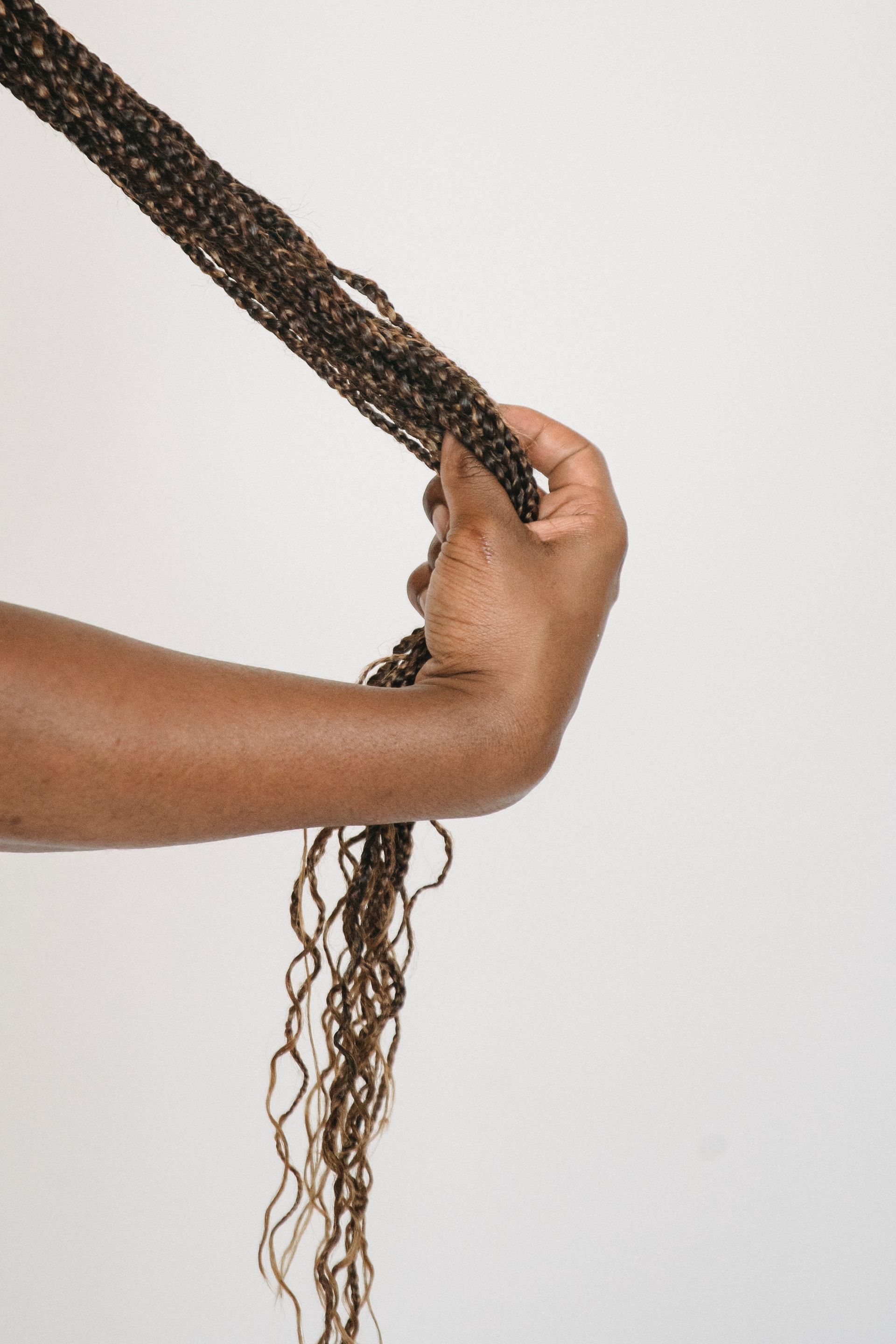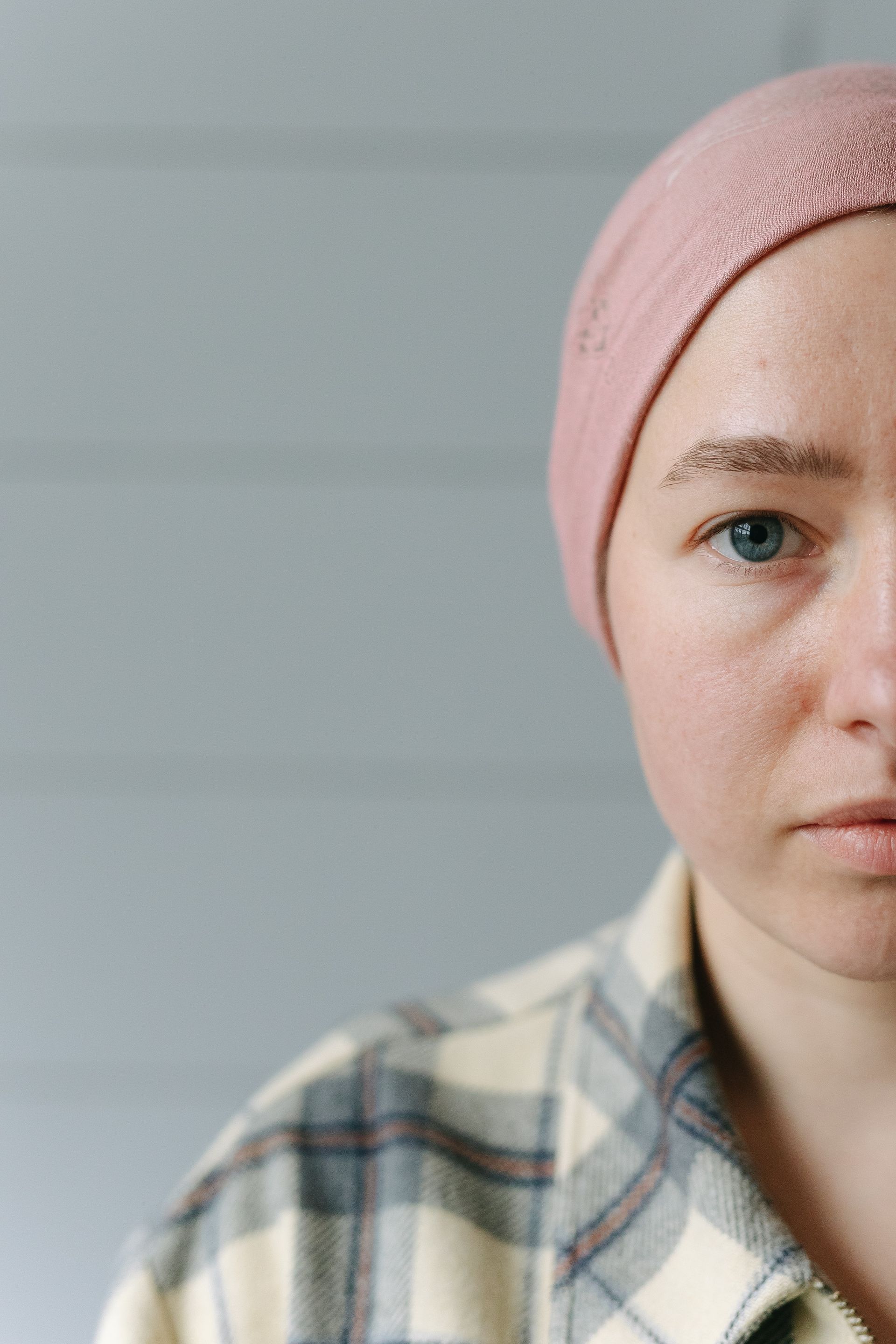Am I losing too much hair?
How does hair grow?
Should we be concerned about how much hair we're losing in the shower or when we run a brush or a comb through our hair? Let's look at how hair grows and some factors that contribute to hair loss to better understand when there might be cause for concern.
To start with, we are born with a set number of hair follicles (pores in our skin where hair roots grow) and our bodies don't create new hair follicles after birth. A person has about 5 million hair follicles and each one goes through the three stages of the hair growth cycle, which typically lasts between 2 to 6 years:
1.
Anagen phase - this first phase is the active growth phase, during which a hair follicle provides blood supply and nutrients at the root. A hair strand grows at a rate of about 1 centimeter per month. This phase can last from 2 to 8 years and about 85% to 90% of the hair on our heads is in this phase. Shorter hairs like eyelashes, eyebrows, and arm and leg hair have a shorter anagen phase of about a month.
2.
Catagen phase - during this transition phase of a few weeks, the hair follicle begins to shrink and detach from its blood supply. The hair stops growing, becomes "club-shaped" (where the bottom of the hair is thicker than the top), and prepares to enter the resting phase. Even though it's transitioning to the next phase, the hair doesn't usually fall out until a new hair has grown to push it out of the follicle. The catagen phase lasts about 4 to 6 weeks.
3. Telogen phase - about 10% to 15% of all hairs on the body are in this resting phase, during which the hair shaft doesn't grow further, but a new hair starts to grow under the shaft. Depending on the location of the hair, this phase can last from a few weeks, for eyelashes, to almost a year, for hair on our scalp. An extension of the telogen phase is the exogen phase, the shedding stage when the old hair completely detaches and falls out. The average person loses about 50 to 100 strands of hair per day, usually while washing their hair or combing or brushing it.
The exact mechanism that controls passage from one phase to the next is not fully known. Hair strands are in a different cycle at the same time and hair growth cycles vary between people depending on age, genetics, diet, environmental factors, stress, etc. Also, overall hair density slowly decreases with age.

What are some common causes of hair loss?
Sometimes the random cycle of hair growth becomes synchronized, resulting in a temporary hair loss called telogen effluvium. This is a sudden onset, generally occurring within three months following situations such as: childbirth, rapid weight loss, surgery, death of a family member, etc. Thyroid conditions and medications can also cause hair loss due to abnormal cycling. This type of hair loss tends to resolve itself after several months, although that may not always be the case.
Genetic hair shedding, known as androgenetic alopecia, can be inherited from either side of the family and affects both men and women. This is the most common type of hair loss and is also known as "pattern" hair loss.
Traction alopecia is where repeated pulling of hair, for example with tight pony tails or braids, results in hair loss. At first, the hair may grow back, but persistent damaging activity can make the loss permanent.
Temporary or permanent hair loss can also be caused by:
- reactions to certain drugs (for example, chemotherapy)
- fungal infections
- inflammation
- autoimmune disease
- having had high fever
- having stopped taking birth control pills
- menopause
- harsh hair care products
- the compulsion to pull out one's hair
If you're concerned about the volume of hair lost every day, have sudden bald patches, or other hair loss concerns, consult your doctor or dermatologist. Dermatologists can distinguish between hair loss and normal hair shedding as they specialize in diagnosing and treating the skin, hair, and nails. As with most medical conditions, the sooner you see a professional, the better the prognosis.

Interested in helping people who have lost their hair?
Besides keeping our head, ears, and neck warm, the hair on our heads is one of the first things we notice about someone. Losing it can mean a certain loss of self-confidence, so replacing it can help to re-establish overall well-being, especially when a person is fighting a disease at the same time.
There are quite a few options for donating hair to be used for making wigs. A quick internet search will show which companies and non-profits accept hair, their focus (for example, kids with cancer), what they accept (for example, curly or wavy hair, gray hair, etc.), the minimum length, and the condition and format that the donated hair must be in to be useful.
Donating hair for a cause that best matches your objectives will be most rewarding.
Resources and References:
- Mayo Clinic on symptoms of hair loss - https://www.mayoclinic.org/diseases-conditions/hair-loss/symptoms-causes/syc-20372926
- Cleveland Clinic on hair follicles - https://my.clevelandclinic.org/health/body/23435-hair-follicle
- Cleveland Clinic on hair loss facts and myths - https://my.clevelandclinic.org/health/diseases/16921-hair-loss-in-women
- Stages of hair growth - https://www.rosemaryhealth.com.au/guides/stages-of-hair-growth
- American Hair Research Society with descriptions of hair disorders and photos of types of hair loss - https://americanhairresearchsociety.org/patient-information/
- American Hair Research Society on the difference between hair loss and hair shedding - https://www.aad.org/public/diseases/hair-loss/insider/shedding
- Harvard Health on hair loss - https://www.health.harvard.edu/a_to_z/hair-loss-a-to-z
- NHS on causes and treatments for hair loss - https://www.nhs.uk/conditions/hair-loss/
- National Library of Medicine on hair physiology - https://www.ncbi.nlm.nih.gov/books/NBK499948/
- Forbes article on hair loss - https://www.forbes.com/sites/neeranathan/2020/06/30/why-extreme-stress-causes-hair-loss/?sh=16884d1f4e6f





